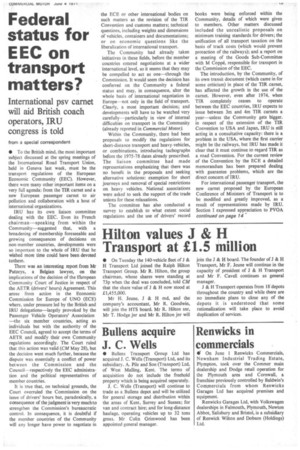Federal status for EEC on transport matters?
Page 15

If you've noticed an error in this article please click here to report it so we can fix it.
International psv carnet will aid British coach operators, IRU congress is told
from a special correspondent • To the British mind, the most important subject discussed at the spring meetings of the International Road Transport Union, held in Geneva last week, must be the transport regulations of the European Economic Community (EEC). However, there were many other important items on a very full agenda; from the TIR carnet and a new European passenger carnet to air pollution and collaboration with a host of international organizations.
IRU has its own liaison committee dealing with the EEC. Even its French chairman—speaking from within the Community—suggested that, with a broadening of membership foreseeable and growing consequences of decisions on nonmember countries, developments were so important to the whole of IRU that he wished more time could have been devoted tothern.
There was an interesting report from Mr Putzeys, a Belgian lawyer, on the implications of the decision of the Ehropean Community Court of Justice in respect of the AETR (drivers' hours) Agreement. This arose from action in the Economic Commission for Europe of UNO (ECE) where, under pressure led by the British and IRU delegations—largely provoked by the Passenger Vehicle Operators' Association —the six member countries, acting as individuals but with the authority of the EEC Council, agreed to accept the terms of AETR and modify their own Community regulations accordingly. The Court ruled that this action was valid (CM May 28), but the decision went much further, because the dispute was essentially a conflict of power between the Commission and the
Council respectively the EEC administration and the political representatives of member countries.
It is true that, on technical grounds, the Court overruled the Commission on the issue of drivers' hours but, paradoxically, a consequence of the judgment is very much to strengthen the Commission's bureaucratic control. In consequence, it is doubtful if the member countries of the Community will any longer have power to negotiate in the ECE or other international bodies on such matters as the revision of the TIR Convention and customs matters; technical questions, including weights and dimensions of vehicles, containers and documentations; or on economic questions like the liberalization of international transport.
The Community had already taken initiatives in these fields, before the member countries entered negotiations at a wider international level, so it seems that they may be compelled to act as one—through the Commission. It would seem the decision has conferred on the Community a federal status and may, in consequence, alter the whole basis of international negotiation in Europe—not only in the field of transport. Clearly, a most important decision; and developments will have to be watched very carefully—particularly in view of internal difficulties on transport in the Community (already reported in Commercial Motor).
Within the Community, there had been proposals to modify the regulations for short-distance transport and heavy,vehicles, or combinations, introducing tachographs before the 1975-78 dates already prescribed. The liaison committee had made representations emphasizing that there was no benefit in the proposals and seeking alternative solutions: exemption for short journeys and removal of special restrictions on heavy vehicles. National associations were asked to seek the support of the trade unions for these relaxations.
The committee has also conducted a survey to establish to what extent social regulations and the use of drivers' record books were being enforced within the Community, details of which were given to members. Other matters discussed included the unrealistic proposals on minimum training standards for drivers; the unification of all transport taxation on the basis of track costs (which would prevent protection of the railways); and a report on a meeting of the Goods Sub-Committee with M Copp& responsible for transport in the Commission of the EEC.
The introduction, by the Community, of its own transit document (which came in for some criticism) in place of the TIR carnet, has affected the growth in the use of the carnet. However, even after 1974, when TIR completely ceases to operate between the EEC countries, IRU expects to issue between 3m and 4m TIR carnets a year—unless the Community gets bigger. in respect of the extension of the TIR Convention to USA and Japan, IRU is still acting in a consultative capacity: there is a problem in the USA, where the first carrier might be the railways, but IRU has made it clear that it must continue to regard TIR as a road Convention. For the current review of the Convention by the ECE a detailed memorandum has been prepared dealing with guarantee problems, which are the direct concern of IRU.
For international passenger transport, the new carnet proposed by the European Conference of Ministers of Transport is to be modified and greatly improved, as a result of representations made by IRU. Section I expressed appreciation to PVOA continued on page 14
































































































